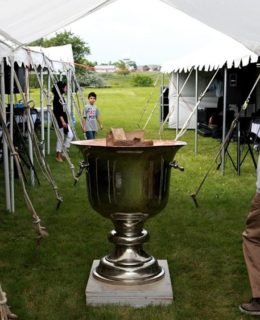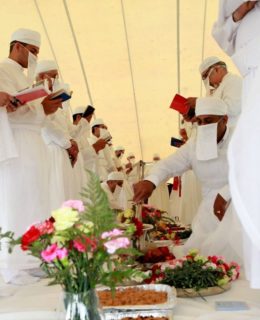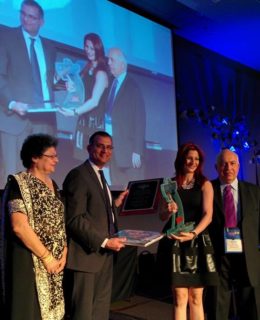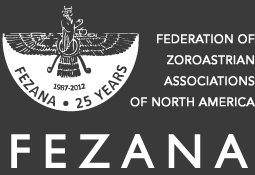
Youth: Chase Godschalk
I learned a lot about my grandparent’s journey to finally end up in the US. I learned about valuable key objects that my grandfather kept with him to remind him of his faith in Zoroastrianism. There were many reasons why they decided to move to the US, such as the weather and the job opportunities. I discovered a lot of new stories and aspects of my grandfather that I had never known. I hope to remember this moment forever.
Participant: Porus Austin
Chase asked all the correct questions, the questions that led me to go into depth about my religion. I enjoyed the process of the interview and the memories I shared with Chase. I am very proud of sharing about Zoroastrianism because others can learn about a different, less-known religion. I hope everyone who sees this interview takes something important away from it, no matter what it may be. This will be a memory I will never forget.
Pursuing Opportunity and Belief: A Journey from Mombasa to Stockton
Date: 7/15/2023
Transcript
00:00:03 Interviewer
Hi, I’m Chase and I’m with my grandfather Porus Austin. All right. Our first question, early beginnings. Let’s begin by talking a bit about your childhood. Can you tell me where you were born, what your family was like, and what kind of education you received?
00:00:20 Interviewee
OK, I was born, uh, January, August 25th, 46. I was number six in my family out of seven. Three sisters and four brothers. I was born in Mombasa, Kenya and all my siblings were born in, in the same, in Mombasa, Kenya. Also, my parents had, my mother was born in Zanzibar, which is part of East Africa, Tanzania currently. And my father was born in India. They got married when my..through, through some people who were introducing them and my father worked in the bank – Standard Chartered Bank. But before he worked there, he worked with Kenya Lending, which was in the customs under the British rule. The British there wanted people who could speak English and he was put in the customs at the young age of 18 because that’s where a lot of Indians went – emigrated to East Africa during that time.
00:02:04 Interviewer
OK. Next question – what did being a Zoroastrian mean to you as a child? Were there obvious markers of religion like a Zoroastrian Community Center around you when you were growing up?
00:02:14 Interviewee
Up there was the Parsi Anjuman. We attended Navjotes and weddings. When I was 10, my Navjote took place at the same day that my sister got married. My sister is currently residing in California, but she got married in Mombasa and then moved to Darussalam, in Tanganika. The community that I was aware of, I had lots of friends, Hindus, Muslims and Parsis. They were all Indians who were to some extent I guess all immigrants of some sort or the other, who were second generation like myself. The first generation was born in India.
00:03:21 Interviewer
OK. I can see you have an artifact close to you. Tell me about this. Why did you choose to talk about it today? And what meaning does it have for you.
00:03:32 Interviewee
Well, this is the portrait of Zoroaster, our Prophet who we consider to be the founder of the religion. And whenever we pray, we sort of don’t worship…we worship through the elements, the fire, the, the wind, the sun and the water. We consider all of those to be symbols of life giving and we can identify in our prayers. We hold Zoroaster to be the Prophet because he was considered…the religion was Ahura Mazda, the Almighty God.
00:04:33 Interviewer
OK. Next question – What factors were responsible for you or your family’s decisions to ultimately move to the United States?
00:04:42 Interviewee
When we were in England at that time, I was looking for better opportunities and my sister was already in the United States in California. So, I decided, my wife and myself, we came and visited California first, and then we decided to immigrate here. We had previously been in Iran, and the climate [here] was suitable for us. We liked California climate and the environment and everything else. And the opportunities were available, whereas in England I felt that at times, they were, the opportunities were very limited for me.
00:05:33 Interviewer
And why did you have to leave Iran?
00:05:34 Interviewee
I left Iran during the revolution. The Islamic revolution took place in Iran, while when I was there, the Shah was on the throne and they did not like the Shah, the way he ruled. So, the Muslims, they would, would, take over and the Ayatollahs had decided that, you know, that they wanted the revolution, and we were part and parcel of it. And we were told to all leave. The company could not guarantee any, any security for us.
00:06:19 Interviewer
OK. Can you describe some of your earliest memories of moving to the U.S.? Why do you think these are so powerful?
00:06:27 Interviewee
The earliest memories of moving to the U.S. was one of the things that happened to me. [It] was after 30 days of sending my resumes to various people and everybody else to the various companies, I joined a company for identifying the insurance, it was an insurance agency, and which is where I worked in London, for an insurance agency and they hired me with my accountancy qualifications. And we decided to move to beautiful Stockton.
00:07:18 Interviewer
OK, how easy or hard was it to integrate into the culture of the U.S.? Did you experience any kind of culture shock? Can you explain more?
00:07:28 Interviewee
There was no culture shock as such because we had already experienced most of it in England and various other parts of the world where we lived. So, we did not feel a culture shock and the people at the company where I was employed accepted me for who I was. And they made me a partner. Percentage of – they gave me an ownership interest in the company that I was working with.
00:08:03 Interviewer
OK. What did you gain and what did you lose when you migrated?
00:08:08 Interviewee
I gained a lot because first of all, it was the beautiful weather that we appreciated. My children were educated here, we have felt freedom of living in the United States as opposed to in England, where we were restrained by the size of the houses and everything else that was going on along there, and the job opportunities that I had. There were a lot more than what I would have had in England.
00:08:46 Interviewer
Can you describe what comes to mind when you hear the word home?
00:08:51 Interviewee
Home is where, wherever I am. Home is where my family is. Uh, I’m not particularly tied to any party, any particular place simply because to some extent, I’m a vagabond in that in that respect that I traveled all over the world, my parents encouraged me to find my own ways and do, to go and adventure into various parts of the world where I felt most comfortable.
00:09:31 Interviewer
Relating back to your home country, can you describe what the social and political conditions were there when you decided to move?
00:09:40 Interviewee
Political considerations, I have no idea what they were like. I was in, I was born in Kenya. I went for schooling to India. Then when I was 18 years old, I moved my brothers and others moved me to England. And then when I got married after Iran, we, when we had a daughter, we decided to move to the States. So, I had no idea about the political side of it. I was never involved in the politics, in the politics of it, various things. And as far as the social aspect was concerned, everything was as far as I’m concerned, I’m OK with that.
00:10:34 Interviewer
Do you still maintain ties with people back in your native country? And how often do you visit them?
00:10:40 Interviewee
I have a sister in Bombay who is married and is living there. I don’t visit Bombay too often simply because I am not very, very enamored with Bombay or India as such. I would only go there but while my parents were alive, I have not been there for many years and I had no reason or intention of going there again.
00:11:11 Interviewer
I mean, you said that you have no reason, but what’s the best part of visiting Kenya?
00:11:18 Interviewee
Not Kenya, India. India, the best part was meeting with the relatives and meeting the Indians, the Parsi food.
00:11:31 Interviewer
OK, what is the Zoroastrian culture according to you? How, if at all, have you strived to preserve Zoroastrian culture while trying to connect with new cultures? Do you have any stories to share?
00:11:44 Interviewee
Yes, I do. I brought up my children to be Zoroastrians. And my daughter has just had the Navjote of her two boys. It was a big affair, and I was involved with teaching them how to do the kasti and the prayers and this was held in Atlanta, GA. United States. I tried to teach them the basic tenets of the religion which was good thoughts, good words, and good deeds, and I hope that they follow it with that.
00:12:35 Interviewer
Do you ever get asked some variation of the question? Who are you? And if you do, how would you respond?
00:12:43 Interviewee
I get asked…because excuse me.
00:12:50 Interviewer
Would you like some water?
00:12:52 Interviewee
I get asked because of my accent. I still have an Indian or mixed accent with England thrown in because I studied there. But normally America is a big melting pot, and California particularly so. So, I don’t get asked too many questions about it. I do get asked about where I got my training and everything else and my and I guess people just accept it for who they are.
00:13:29 Interviewer
Do you consider your identity as a Zoroastrian different or similar to that of the members of your family? What about members of previous generations of your family?
00:13:38 Interviewee
My family is..I married a Chinese girl from Malaysia, lady, I should say. So, we are quite mixed up in the kids. My daughter was born in Iran. My son was born in England. And I am not particularly close to the affiliations of religion or for whatever it is, I still practice my religion. And I hope that my daughter and my grandsons do the same. But I don’t, I never forced them to do anything because I always feel that people should make up their own mind as to what they want to do.
00:14:35 Interviewer
What does it mean to you to be a Zoroastrian? What emotions does being a Zoroastrian evoke in you?
00:14:42 Interviewee
The emotion basically, … I’m quite proud of being a Zoroastrian. I always tell people when they ask me what religion am I, and I basically try to educate the people who know very little about Zoroastrianism because it’s not a well-known religion or not as Christianity or Islam or whatever it is identified as. I tried to live by the tenants of the religion and what it was meant to be. Whether I’m doing a good job of it or not, I don’t know.
Part II
Date: 7/16/2023
Transcript
00:00:02 Interviewer
OK. Going back to topic #3, how smooth or tumultuous were the transitions for you? Can you elaborate on your emotions during the move?
00:00:12 Interviewee
My emotions were very exciting. I was excited to come to the United States, because I felt that we had a lot more opportunities here. And thus I felt excited about coming here.
First, foremost, we were here, as I mentioned before, on a vacation to Florida, I mean to California and we really thought that the weather made a vast difference to what we faced in England. And that this was truly an opportunistic time for us to come here. Because America, or the insurance industry in Stockton, required somebody of my caliber or training to help them. Move, move them forward to the new, new, phase of their business. So, I enjoyed that.
00:01:19 Interviewer
What factors helped or hindered your mobility? Did your Zoroastrian faith play a role in these types of transitions?
00:01:27 Interviewee
No factors affect, affected my mobility. The only reason why we were allowed in to start with was because I was born in Kenya and under the quota system that the United States had at that time, we were allowed in as opposed to we were be in line if we applied as a British citizen or an English citizen.
So, we were allowed in pretty quickly and when we landed in, we first landed in Los Angeles because we, I felt that Los Angeles, being a bigger city, more businesses there. And with my training and everything else that, that offered me a lot more opportunities.
However, one of the applications that I had sent landed on my boss’s desk in Stockton. And I came for an interview in Stockton. And I called my sister up. Who were living, who was living in Sacramento at that time, which is only about 60 miles from here. And I told her that, hey, I got this opportunity in Stockton and without, without, understanding what the opportunity was or whatever it is, she insisted, she said that, hey, this would be a good place for me. So, I figured that she knew better than I did.
Although she did not know anything about Stockton at that time, she knew everything about Sacramento. But 60 miles was what she wanted her brother to be at, you know, close enough to her. So that’s where we went.
00:03:23 Interviewer
Is the U.S. your home now? How long has it taken you, if at all, to feel like you are at home in this country? Why do you think it took so long?
00:03:33 Interviewee
We adapted to the U.S. very quickly. U.S. is now my home. I consider to be, to be a full-fledged citizen of the United States of America. I have had my children go to school here. They both went to all the way through school and college and they’re very successfully, you know, integrated into this community. And to the, to the vaster community, I would say of what is around us. We’ve been in Stockton for the last forty odd years. And we are very happy here. We have a nice home and nice neighbors and are accepted wherever we are, we have been.
00:04:32 Interviewer
How do you stay connected with people in your native country?
00:04:37 Interviewee
With the native country, I have great difficulty in staying in touch with anybody simply because I did not eh, I was born in Kenya, Mombasa, as I said before, and not many people are left there anymore in Mombasa because of the political climate and everything else. Ultimately, my parents also moved from Mombasa to India. Which is, which was their home country. And my sister is in India, my aunties and my uncles were all in India and so I do not stay in touch with them as frequently as I would like it to be, simply because to me I have to be an American once and for all and accept the fact that this is a melting pot. And all religions and all people from all over the world come to California and to America for betterment. And that’s where I have been.
00:05:52 Interviewer
Do you have any regrets about coming to the United States?
00:05:55 Interviewee
No, no regrets at all. The reason, as I’ve said, I’ve done very well in the United States. This has been a land of opportunity for me. I have made a life for myself here. I have. My kids have grown up here, they’re married and they have their children. So as far as I’m concerned, this has been the best place I’ve ever been to.
00:06:25 Interviewer
Could you describe your educational journey?
00:06:28 Interviewee
My educational journey, well, when I was 10 years old, my parents packed, packed me off to boarding school in India, where my brothers were in Panchgani, India and I did my SSC, uh schooling there.
And then when I was 18 years old, 16 years old, I finished my SSC and my brothers felt at that time felt that it would be better if I wanted to do accountancy, to do it in England and I was set off to do chartered accountancy in England. And that’s where I ended up as being.
And since then, I’ve always been a chartered accountant or finance director or CFO for various companies and issues. And I’ve used my knowledge and experience every, every step of the way to go further and further up the line.
00:07:39 Interviewer
OK, let’s talk about food. What were some of the earliest dishes you cooked when you migrated to the US? What is your traditional food like? Do you prefer traditional cuisine or American food and why?
00:07:50 Interviewee
Ohh my wife is a great cook. She had to learn a lot of the Parsi dishes that I like and enjoy. Like Dhansak, Kari Chaval, Cutlets and things of that nature. I’ve introduced some of it to her. She’s been a wonderful cook. Through trial and error, we learned how to do all our cooking. We’ve got the Time and Talent book and Jaru Mehta’s, Book of Parsi Cooking, which we, which we learned and followed diligently. We made some mistakes in our cooking and I had to eat some of that stuff. But it was OK. It was, you know, as long as it was spicy and it combined my taste, you know, to various things, we were OK by that.
We have lots of Indian stores here where I buy our lentils and rice and curry powder and everything else, so there is no shortage of food in the United States as far as I’m concerned, everything is available.
00:09:06 Interviewer
What kinds of traditional clothes, if ever, do you wear and when do you wear them?
00:09:12 Interviewee
I don’t have traditional clothes and I don’t wear the traditional clothes as such. Shirts and pants, which is worn everywhere. I do have a sudra and kusti which I wear when I do my prayers, although I don’t wear it every day. And, the slippers, I find them very uncomfortable, so I don’t bother with it. I walk barefooted in the summer months.
00:09:43 Interviewer
One of our greatest challenges as a community is to encourage young individuals like me to view their Zoroastrian self as integral to who they are. Do you have any suggestions or recommendations for families, teachers, community members on how they can assist young individuals in making this important realization as they explore their identities?
00:10:05 Interviewee
I always have believed that it’s up to the parents to train their children and bring them up into whatever religion that they feel is important to them.
To that extent we encouraged my son and my daughter to have their Navjotes here in Stockton. And we were very happy that they continue with their prayers today and they in turn have encouraged their sons. At least my daughter has too, and part of it is, she had their Navjote ceremony in Atlanta to train them and teach them the basics of the religion, the good thoughts, good words, and good deeds is what they were taught to be and to lead a decent and faithful life.
We had the Navjote ceremony in Atlanta where we had a priest from Chicago and a priest from Atlanta. Two priests and my cousin, who is becoming a Navar I guess or whatever you would want to call it. Yes, Korshed. She came from New Jersey and my daughter had a big function for them because part of the religious ceremony is to break bread after the performance of the sudra and the kasti that the boys undertook.
And we encourage them to learn the prayers by heart. We used Google in our case to teach them how to do the prayers, and they called me every day, for months at a time, and learned the prayers by heart so that they would be very competent in understanding the prayers and what they were up to.
00:12:30 Interviewer
Do you think that if you had stayed in Iran or India, your kids would have learned more about the Zoroastrian religion?
00:12:36 Interviewee
I don’t think so. They, they might have learned a little more, but they would have also picked up all the bad habits of the religion that people tend to have. The people in India particularly tend to isolate themselves to being just the Parsis or the religion that they follow whereas here in America they have an open mind and they can do whatever religion they want to follow, However, I would like them to follow the religion because I feel that it teaches, it’s a good religion that teaches them the basics of life, and soon after that it’s up to them to understand the meaning of why we are participating in this particular form of religion. I believe all religions are good and they do the same.
00:13:38 Interviewer
What advice do you have for future generations of Zoroastrians looking to move to the US?
00:13:44 Interviewee
The advice is “Guys, this has been a great opportunity for everybody.” In India, what happens is that if you, it’s who you know as opposed to what you know that happens. Whereas who you know can be your uncle or your aunt or relative, or somebody who gives you the employment. Whereas in America, it’s what you know that’s very important. And by working hard and honestly. This country offers all the opportunities that anybody can look forward to earning themselves a good life.
00:14:26 Interviewer
If you could change one thing that you did from your past, what would it be?
00:14:30 Interviewee
One thing – wow, I don’t know whether I would change anything from my past. The reason why I say that is because I have traveled all over the world and I feel that my life has been fully, well, it’s been full of surprises in the sense that I went to boarding school, I went to, I didn’t go to college, but I did my articleship in England. We’ve been to Iran. We’ve been to Australia. And we’ve traveled all over the world. So, I think we’ve achieved everything that we’ve set out to do.
00:15:17 Interviewer
Well, thank you for being a part of this interview and I’m really grateful that you could tell us information of the Zoroastrian community, it’s been a pleasure.
00:15:29 Interviewee
You’re welcome. Thank you.




